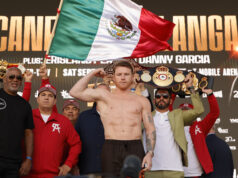
ARLINGTON, Tex. – In January of 2009, Mexican Antonio Margarito was caught with a plaster-like substance smeared on the knuckle pads of his hand wraps before a defense of his welterweight title. His license was revoked. He was banned from prizefighting for a year. But his countrymen did not abandon him. Why not?
To answer such a cultural question one would need a sociology laboratory. Fortunately, in the East Side Plaza of Cowboys Stadium, there was one.
Saturday night, at a match that Manny Pacquiao won by large-as-possible margins, Margarito did not want for fans. He wanted for class and endurance, perhaps. But not fans. How could his popularity not have waned?
With camera crews – local, national and international – lurking, there were plenty of Mexican fight fans from which to draw an opinion sample about that, in Spanish. And the sample came in the form of two questions, the first of which went: Have you forgiven Margarito for what he did, or do you think he even requires forgiveness at all?
“It happened a long time ago, and nobody told him what was on his hands,” said Marisol Manis, an attractive woman from the Mexican state of Veracruz, who dressed in GreenWhiteRed and held a handwritten sign encouraging Margarito. “In our culture, the Latin culture, the past is the past.”
Roberto Pantoja, a well-dressed man from Margarito’s hometown of Tijuana, thought the entire incident was questionable.
“It was a judgment brought by (a rival promoter),” said Pantoja. “It was doubtful.”
Pantoja, interestingly, was not the only Mexican who thought a certain Mexican-American fighter-cum-promoter was involved in what was found in Margarito’s hand wraps. Sergio, a Tijuanense who wore a Mexican flag knotted on the front of his forehead and draped over his shoulders like a turban-and-cape getup, also found the circumstances of Margarito’s banishment suspicious.
“There is no reason to forgive (Margarito),” he explained. “It was an injustice done by Oscar de la Hoya.”
While colorful, such conspiracy theories are discredited in the testimony heard by the California State Athletic Commission in 2009, testimony the CSAC used to revoke Margarito’s license, finding that even if Margarito’s trainer was the only one aware of the illegal inserts – as Margarito still claims – that was cause enough.
Other Mexicans gathered at Cowboys Stadium on Saturday were reticent about addressing what happened in that Los Angeles dressing room 22 months ago and more interested in the present.
“We are all humans, and we all make mistakes, Margarito, too,” said Carlos, a twentysomething guy from the Mexican state of Monterrey, dressed in a Mexican baseball shirt with the number 10 on the left breast pocket. “He’s a good boxer, and we always support Latin fighters.”
Which raised the second opinion-sample question: Did Margarito’s fans feel a personal connection with him, or did they gather in Dallas mostly to cheer the Mexican flag?
“I am here supporting him because he is a good boxer,” said Eric, a young man from the Mexican state of San Luis Potosi, who wore a Mexican flag round his neck like a cape. “And because he’s Mexican. Both.”
Jose, a middle-aged man from the Mexican state of Durango, wearing a dark leather jacket and drinking a beer at a table in the concourse, was firmer about his loyalty.
“We feel a real connection with Margarito,” he said. “We have followed him for years. We like his manner of fighting. Good fights.”
Perhaps, then, the last explanation is the best. Mexicans, in their proud fighting tradition, want a good scrap when they spend their pesos for a prizefight. Margarito, for all his questionable actions and judgment, has never failed to make the type of fights that enchant his countrymen.
Asked after his beating from Pacquiao, one in which he lost every round and had both eyes closed by cuts, if he ever considered quitting, Margarito spoke to his people’s heart.
“Not possible,” he said. “I am a Mexican. A Mexican never ceases in a fight.”
Laboratory closed.
Photo by Chris Farina / Top Rank










